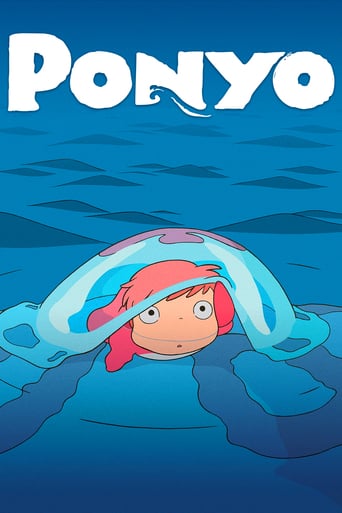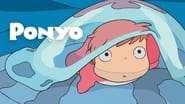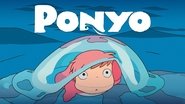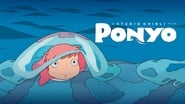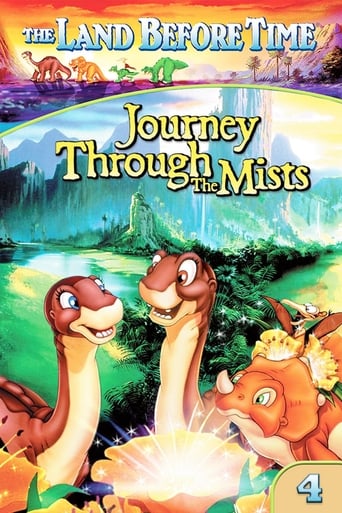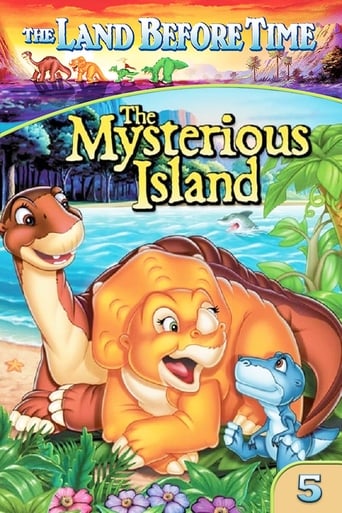sol-
Rescued by a human boy, an inquisitive goldfish grows human features and becomes a young girl herself in this fantasy film from Hayao Miyazaki. On the surface, 'Ponyo' might sound like a simple fairy- tale, but with such youthful and altruistic protagonists, the film soon becomes less of a love story and a more a fantasy indulgence movie in which a boy's greatest dream of being able to play with his new pet like a best friend comes true. The goldfish's father, who comes to the surface to bring her home, is an unexpectedly fascinating character too; he is the ultimate overprotective parent, ruing "if you can only remain pure and innocent forever", with the film as much a tale about parents letting go and letting their kids be themselves as is it a film about pet relationships. Not everything about the film totally adds up; the boy's mother, for instance, does not even stop to question who this little girl is who claims that she used to be her son's pet fish. The film makes up for any narrative gaps though with some great ecological messages as per Miyazaki norm (human ocean pollution in this case) and the animation is simply exquisite, with blue fish and ocean waves magically blurring together at certain key points.
ElMaruecan82
Whether on Earth, Air or Water, Hayao Miyazaki is always in his element. The Master can depict a hostile or kindly wilderness, a sky filled with thunderous clouds or a tidal wave or any possible natural setting or ecosystem with a scientific caution for details, but always with a delicacy in the line that only hand-drawn animation can provide. I think there's a reason that goes beyond aesthetic considerations: CGI can make everything possible, but going for the hard way deepens the spiritual connection with the subject and we know how deeply Miyazaki feels about Nature.Watching the magnificent jelly-fish ballet at the opening made me realize how CGI almost ruined the magic of animation. There's no doubt that "Finding Nemo" rendered a more spectacular vision of the ocean but remember the bubbles in "Little Mermaid", the flood in "Fantasia"'s 'Sorcerer's Apprentice' or the 'Monstro' sequence in "Pinocchio", the depiction of sea demands a level of painstaking efforts that computer imagery solved too instantly to carry any form of poetry. And the merit of Miyazaki is to make a film that looks drawn, even more cheaply than the films I mentioned, you can spot some coarse circles when you freeze the images and realize that when taken alone, they don't invite for wide-eyed reactions, but put together, they do justice to the majestic beauty of nature and more than anything, they're accessible. We feel like we want to drown into it. CGI makes beauty an inaccessible thing, too beautiful to be true.Animation for Miyazaki almost works on a spiritual level, the more efforts you put, the more devotion you display to your subject and the more emotionally rewarding the experience is. To put it simply, the effects of "Ponyo" are actually less impressive than "Chihiro" or "Mono-noke" (which isn't saying much) but the effect of the story is no less powerful. It also seems like with age, Miyazaki has developed more serenity and doesn't even try to spice up his plots with antagonists, even three dimensional ones. "Ponyo" is a villain-less story about a little half fish/half human creature who hazardously drifts ashore in a small fishing town, to be rescued from the jar bottle she was stuck in, by a five-year old little boy named Sosuke. She thanks him back by licking his and healing his blood wound. When she's taken back by her father, a sort of wizard/ scientist she says she wants to live among humans and is immediately locked in. We learn later it's one of the side-effects of licking human blood.But her siblings (little fishes with anthropomorphic faces) allow her to grow some magical powers and become a little girl. What follows is one of the most epic scenes of any animated film, and I'm glad that "The Ride of the Valkiries" won't be forever associated to a deadly bombing in Vietnam but also the exhilaration of a little girl's joy, literally running over the waves, causing a tsunami over the sea side. This scene is too epic for words but it settles the film's status as one of Miyazaki's best, he literally gets intoxicated by his own wizardry and provides one moment we didn't see coming. The strangest thing is that a tidal wave was a possible scenario but one would have expected a bad guy to cause it, here it's the very joy of Ponyo that will cause troubles on Earth, as if things were easily getting out of control with children, even with the best intentions, so adults aren't totally useless.I love movies that can both say a child must follow his dream but listen sometimes to his parent, like Disney's "Pinocchio". Ponyo has some connection with the little boy, with a father who proves to be a responsible man, worried that her disappearance provokes a loss of imbalance and threatens the Earth, and a mother who carries some resemblance with the fairy who gave him life. Sosuke's mother is a strong-willed woman who braves danger in order to save old women from a nursery home, and even the old ladies have enough wisdom to provide some good lessons to Sosuke and complete the positive depiction of humanity over three generations. This is a film where children can act like adults, through the beautiful friendship between Sosuke and Ponyo and when old women can act like children too. And then there's Ponyo, one of the most fascinating animated characters of recent memories.Just from the start you can tell there's energy pumping in her little body, she just wants to get the hell out, and no matter how hard you squeeze her, there are not enough bubbles to contain her. Her head takes a human form, she grows palms that turns into hands and feet and the connection with human evolution are unmistakable. We all came from the water, and maybe we should value the luck we had to grow as complex but fully functioning creatures. Yes, we'd rather have Ponyo as a girl than a fish; she's more relatable that way, especially since it's driven by friendship, another relatable human emotion, like love or joy. And maybe "Ponyo" is an invitation is an invitation to value our gifts as human beings and thus respect nature.The film also shows the ravages of pollution, the trash left in the sea in sequences that recalls the mysterious guest's wash in "Spirited Away".Miyazaki is known for his environmentalist views, but the message doesn't come as a warning or a threat but a simple invitation to respect the creatures who didn't "choose" to get off the sea, respect their environment, their source of life which happens to be ours. Sure, it's relevant for Japan, an Island that has always been dependent on the benefits of sea but the film is also a universal hymn for love, friendship and harmony between men and nature. And it's also a terrific feel-good movie!
Eric Stevenson
It's been way too long since I've seen a Miyazaki film. It's a shame that his films don't do near the box office reception of something like that awful Yu-Gi-Oh movie. Of course, this is still the highest grossing of his films. I truly believe this is close to "Spirited Away" as one of his best works. I guess it's because the animation is just so wonderful. I mean, it really seems like every moment of this film there is movement involved. There's a slight change in the outlines of all the characters.I had no idea this was inspired by "The Little Mermaid". It certainly seems nothing like the Disney movie. I personally don't find that one of my favorite Disney films and I find this much better. The voice work is fantastic. I'm generally not into celebrity voice actors but they make it work so well here. This film might be his most adorable. I guess it's just great to see Ponyo's miniature sisters swimming around everywhere.The plot is that there's this fish that escapes from her underwater home and meets a boy named Sosuke (yep, that reminds me of Sasuke from Naruto), making her want to become human. Every character is just teeming with cuteness. I especially love how realistic all the underwater creatures are. I think my favorite part might just be the first six minutes without dialogue as we see how well detailed they are. This really is one of the best movies I've ever seen. Not only is the pacing wonderful, but it's great to see a lot of the more mundane scenes like Sosuke's mother getting through her day. It shows that as strange as any animated film may be, it does in fact work hard to be realistic.This is only my third Miyazaki film, but already you can call me a fan. It even seemed like he was trying to imitate western animation more here. Ponyo as a fish and her sisters look a lot less like his normal style. It's always great to experiment with something new, especially for someone as great as him. Even every bit of the credits is adorable.I wish this guy would work for Pokemon! Hey, it's my first IMDb review! This is easily a 10/10!
Brian McAfee
Spoilers, but really, there's not much to give away, its Ghibli's version of Disney's version of the Little Mermaid.Synopsis: Ponyo is a goldfish who lives under the sea with her wizard father and many goldfish sisters. One day she ventures to the surface to satisfy her undying curiosity about the world above the surface. She meets a boy named Sosuke there, and a strong bond of love develops between them. She gets into her father's magical elixirs, miraculously acquires legs and goes to live with Sosuke on the land as a real human girl, but Sosuke must make a commitment to her, or she will dissolve into sea foam, and the world might end (not really sure about that last part, it wasn't very well explained)Story: 6.0 This, as the poster says, is the Little Mermaid. Well, kinda. Hans Christian Anderson's The Little Sea-Maid was actually a tragedy, and had an appropriately tragic ending. Now, there's nothing wrong with doing a Miyazaki version of the Little Mermaid, but I still can't give it high marks for originality, unlike many of his other movies which had brilliant stories. Really, the thing I had the biggest problem with was that Miyazaki set everything up to follow the Anderson version, even adding the sea foam element, but at the last minute, the great "test" ended up being nothing but an underwhelmingly simple question. Lots of buildup, and then the story Disneyed out, lacking the courage to stick with the Anderson ending. Just like Disney, they take Anderson's The Little Sea-Maid and tack on a happy ending, but this was obviously tacked on with little effort. Perhaps if the "test" had been more of an ordeal I could have accepted it. We might as well have been watching an animated version of one of Shakespeare's tragedies, but everybody lives in the end, with nothing more than a single line of dialogue to explain the difference.I understand that this was supposed to be a movie for five year olds, but Miyazaki seems to have forgotten that five year olds don't pay for movie tickets or buy DVDs, their parents do. This movie, unlike his other works, has little to offer older audiences. It doesn't have to end with the mermaid dead, but you could have at least let the tension build so audiences felt relief when the expected tragic end was avoided.Animation: 8.0 The animation here is not as strikingly beautiful or detailed as Spirited Away, but it's still gorgeous. The character designs are typical for Ghibli. Perhaps the best of the visuals appears about half way into the movie, where Ponyo has acquired the magic she needs to become human and she runs along the surface of the stormy ocean to get to the land and see Sosuke. It's impressive, and worth watching the movie if just for this sequence.Sound: 7.0 The Japanese cast definitely put more emotion into their performances. I wish Disney would hire more professional voice actors rather than going for big names. Not that Liam Neeson or Cate Blanchett did a bad job. Actually I enjoyed their performances. It's just that they are so recognizable, and also that there are so many truly great voice actors and actresses out there that could have done this, possibly better. A good example is during the scene where Sosuke and his mom are driving in the storm, trying to get home from the Senior Center while the waves crash around them. Tina Fey's performance is good, but Tomoko Yamaguchi was superior, vocally conveying the peril of her situation where Fey sounded more "in control." The music was almost entirely orchestral, and fit the feel of the movie. There were very few vocals. The credit song, "Ponyo on a Cliff by the Sea," is cute and fun. Overall, it's a good soundtrack for the movie, but not one I would buy.Characters: 7.0 Characters are where Miyazaki has always excelled. He is such a keen observer of human behavior, especially that of children, that his animation captures them like magic and this is no exception. However, when re-creating the story of the Little Sea- Maid one character was left out, and that robbed the story of its necessary tension. In the original, there is another girl. The Prince has to choose between the Mermaid and a human Princess. It's a triangle, and that is of course why the ending fell flat. Of course he was going to choose Ponyo, there was nobody else. Also, Sosuke has a dad who is captain of a ship. The part seems to have been added just so Matt Damon could have half a dozen lines in the film. Add to this that earlier in the movie, Fujimoto, Ponyo's dad, states that he wants to rid the world of all the nasty humans, but now he's fine with his daughter becoming one and going off to live with them. That's a hell of a flip-flop to let go completely unexplained. Unfortunately, Fujimoto's miraculous change of heart seems to be the only development we get from any character in the show.Overall: 7.0 There were moments of pure magic in this film, as there are with all Miyazaki films. It was beautiful. While there may have been issues with the story, the animation and sound were still worthy of a Ghibli film, and that makes it worth watching. I recommend it, but only to those who have already seen all the others. If you still haven't seen Spirited Away, Mononoke Hime, Nausicaa, or My Neighbor Totoro, see those first.
